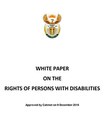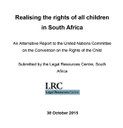
Latest resources



The Civic Protest Barometer (CPB) measures trends in protest action in South Africa's municipalities. The 2016 CPB is an update of the CPB published in 2014 (Working Paper Series No. 1), which covered the period 2007 to 2014. The current CPB (Working Paper Series No. 2) analyses data from January 2007 to July 2016 (inclusive).

This research study presents information on the frequency and the nature of civic (service delivery protests) throughout South Africa. The study as a whole draws on different methods for three periods. The first period dates from the inception of the study in 2007 until the end of 2011. A new method, currently still being used, was adopted for the period after 2011. Once gain the method was changed in 2016. The initial component derived protest records from the media reports of community protests contained in the Community Protest Monitor in the South African Local Government Briefings Report1 and Lexis Nexis online database. Data was collected monthly from 2007 until August 2012 and displayed in a series of barometers that analyze overarching trends and patterns in protest activity over the period. After 2011 the method changed to rely on on-line news aggregators and social media reports rather than Lexis-Nexis and the Local Government Briefings.



The Performance Index (PI) is the last of the three indices that collectively comprise the Capable Cities Index (CCI). The other two components, the Compliance (Coml) and Capacity (CI) Indices, were published earlier this year. The series will be concluded with the publication of an index that combines the three indices into composite index. This Capable Cities Index provides a means to compare the overall sustainability of municipalities in terms of how well they are managed.

Numerous eviction incidents occurred in South Africa during 2014, as a result of which many people were left homeless despite the legal safeguards that should protect them. The courts also decided a number of eviction cases and applications in that year. This study examines these incidents and cases with a view to reviewing the state of eviction in South Africa in 2014 and drawing lessons and conclusions from it.

Findings from Eastern Cape and Gauteng




The Capable Cities Index (CCI) is a composite index that ranks the 27 largest cities in South Africa on the basis of their consistency in maintaining high levels of capacity, performance and compliance over the period 2010 to 2014. A capable city is one that maintains consistently high scores in all three components of capability.

This is the third edition of the MAC-B Audit Consistency Barometer to be published. The first MAC-B was published before the national and provincial elections of May 2014. This iteration (referred to as MAC-B3) is an update to both that version and the update (MAC-B2) published last year. MAC-B2 represented a key milestone in local government development in that the period then reviewed coincided with the term of the national administration appointed after the 2009 national election. Until then the instrumental Department of Cooperative Governance and Traditional Affairs was under the stewardship of Sicelo Shiceka. After the 2014 election a new administrative cycle under the stewardship of Pravin Gordhan as minister of Cooperative Governance and Traditional Affairs (COGTA) began.


The Compliance Index (ComI) is one of three indices that together comprise the Capable Cities Index (CCI). The Capacity Index was published in early 2015 and the Performance Index will be published in due course.

The Community Law Centre’s Children’s Rights Project is calling for a consultant to produce a concept note for the commemoration of the Day of the African Child (DAC) 2016 on the theme, “Conflict and Crisis in Africa: Protecting all children’s rights”.

This is the first issue of the ESR Review in 2015. For the realisation of socio-economic rights, 2015 began on a high note with South Africa’s long-awaited ratification of the International Covenant on Economic, Social and Cultural Rights (ICESCR). This issue includes an article by Usang Maria Assim that summarises South Africa’s initial report to the African Committee of Experts on the Rights and Welfare of the Child (ACERWC), reviewing South Africa’s progress towards the realisation of children’s socio-economic rights. Gladys Mirugi-Mukundi examines the recent decision of the Supreme Court of Appeal in City of Johannesburg Metropolitan Municipality vs Hlophe, which found that the fundamental constitutional value of accountability requires municipal officials to see to it that municipalities under their control obey court orders.


This research study presents information on the frequency and the nature of service delivery protests throughout South Africa. The study as a whole draws on different methods for two periods. The first period dates from the inception of the study in 2007 until the end of 2011. During this phase the barometer was know and the Municipal Service Delivery Protest Barometer.

Welcome to another insightful edition of Article 40, the first edition in 2014.

This second issue of the 2014 ESR Review includes two features on the enjoyment of socio-economic rights in Nigeria and South Africa. It also examines a recent decision of the South African Constitutional Court, in which it found that an interim order could as well amount to an eviction order and may interfere with the constitutional right to housing.

Our previous report Operation Clean Audit 2014: Why it failed and what can be learned examined the impact of national government’s policy that all municipalities must achieve clean audits by 2014 (OCA 2014) and identified the risks that arise when policy is not based on statistical analysis. This report shows how measuring consistency in municipal audit outcomes over the five-year term of office of local government can be a useful proxy for analysing, not only the resilience of local government, but also the utility of the provincial and national powers of corrective intervention under s139 of the Constitution.

The FFC is government's primary advisor on intergovernmental fiscal relations. This 20-year review assesses (1) the relationships between the FFC and the various component parts of the South African multilevel government system (2) the FFC's impact on decision making and (3) the FFC's governance and administrative performance.

The Community Law Centre is calling for consultants to produce a concept note for the commemoration of the Day of the African Child (DAC) 2015 on the theme, “25 Years after the Adoption of the African Children’s Charter: Accelerating our Collective Efforts to End Child Marriage in Africa”.

This first issue of the 2014 ESR Review focusses on the potential of the International Covenant on Economic, Social and Cultural Rights as a tool for poverty reduction in South Africa. It also looks at Developing Cape Town’s right to housing in the rental sector. There are also summaries of recent developments on socio-economic rights across the world.

In 2009 the new Minister for Cooperative Governance and Traditional Affairs (COGTA), Sicelo Shiceka, launched Operation Clean Audit 2014 (OCA 2014). It was the signature intervention in the incoming Zuma government’s plan to “turnaround” local government. The objective of OCA 2014 was that all 283 municipalities (now 278) and provincial departments should achieve a clean audit on their financial statements by 2014.
On 28 March 2014, the Community Law Centre hosted a seminar on states’ obligations in relation to implementation and reporting under the International Covenant on Economic, Social and Cultural Rights (ICESCR) and its Optional Protocol. Since the announcement in October 2012 that South Africa would ratify the ICESCR, which it signed on 3 October 1994, civil society has followed with interest the events that have unfolded. In this regard, the seminar had two main objective was to discuss the ICESCR and OP-ICESCR with stakeholders who would enrich the policy debates at parliamentary and political party levels and at the community level. In his opening remarks the director of the Community Law Centre, Prof Jaap de Visser, recalled how the civil society campaign to advocate for the ratification of the ICESCR was ‘born’ in response to government’s failure to do so, despite having signed it in 1994. The campaign engages in several activities, including holding strategy meetings and engaging with Parliament, government and state institutions (through letters and meetings). He highlighted the importance of state accountability, especially by office bearers.

This issue of the ESR Review coincides with the celebration of Human Rights Day in Africa on 21 October, which commemorates the coming into force of the African Charter on Human and Peoples’ Rights (the African Charter).
